Cinegy Multiviewer Agent
Reading time ~5 minutes
Cinegy Multiviewer Agent is a Windows-based alert management service for monitoring and consolidating alarms from many Multiviewers allowing redundant configuration.
About Cinegy Multiviewer Agent
Cinegy Multiviewer Agent is a standalone service that can connect to multiple Cinegy Multiviewers and receive alerts from them. Cinegy Multiviewer Agent analyzes incoming alerts and sends notifications based on certain criteria.
Below is the diagram representing the general concept of Cinegy Multiviewer Agent operating and managing:
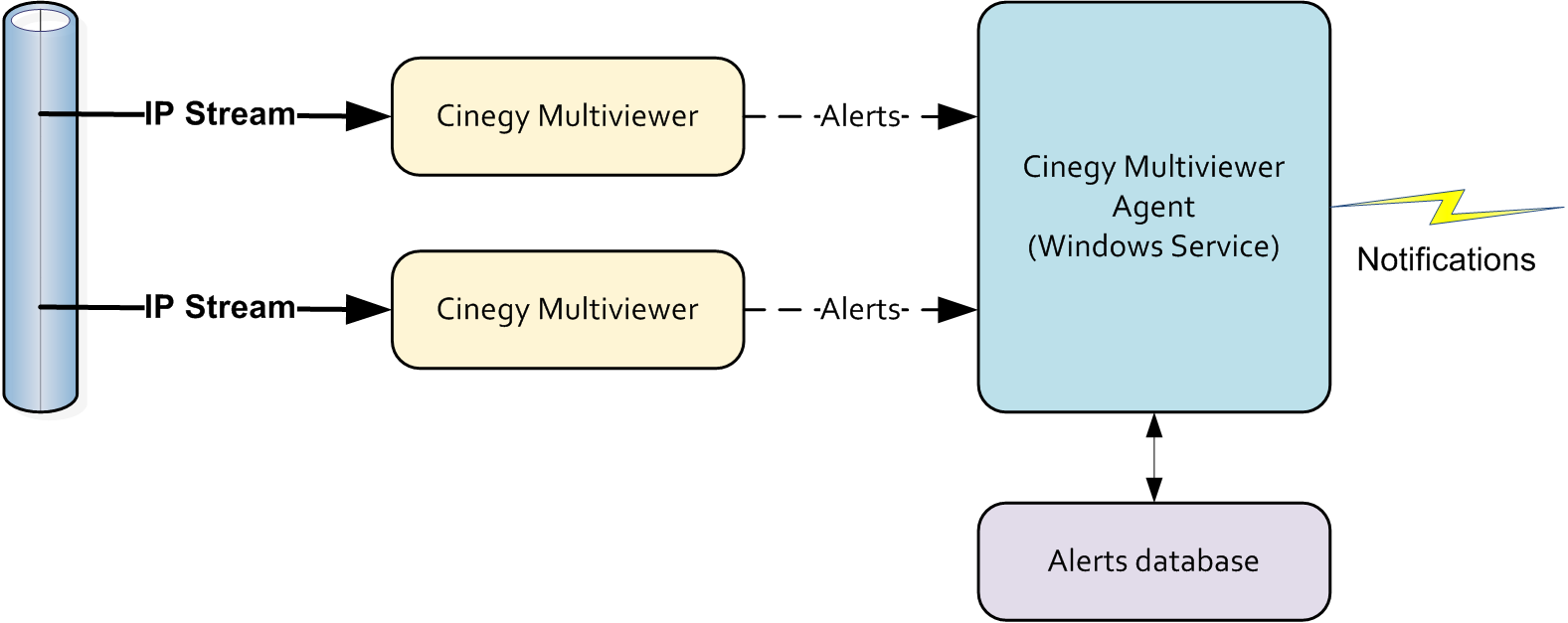
In this case alerts are analyzed from multiple Cinegy Multiviewers that monitor the same stream. If a certain problem occurs with the stream, both Cinegy Multiviewers generate identical alerts. Cinegy Multiviewer Agent receives these alerts and sends only one notification preventing the unnecessary duplicates sending.
Cinegy Multiviewer Agent Configuration
|
To run Cinegy Multiviewer Agent Configurator, double-click its desktop icon or go to Start > Cinegy > Cinegy Multiviewer Agent Config. The following configuration utility will be launched: |
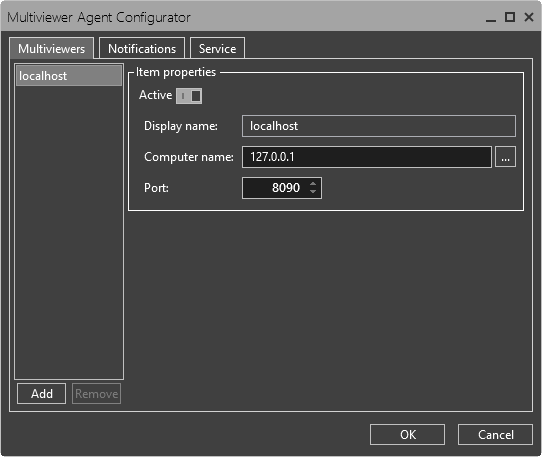
Configure the required settings in the corresponding tabs as described below.
Monitored Multiviewers
In the list of Cinegy Multiviewers on the left, the localhost is configured and activated by default.
|
Press this button to add a computer with configured Cinegy Multiviewer on it to the list of monitored machines. |
|
Press this button to remove a computer with Cinegy Multiviewer from the monitored list. |
In the "Item properties" section the "Active" toggle switch is activated by default. Deactivating this option makes it possible to stop receiving alerts without removing the machine from the list.
In the "Display name" field enter a custom computer name to be displayed in the Cinegy Multiviewer Agent window. Define the IP of the machine in the "Computer name" field or select the machine using the  button. Specify the port number in the corresponding field using the
button. Specify the port number in the corresponding field using the  buttons or entering the desired value via the keyboard.
buttons or entering the desired value via the keyboard.
|
Note
|
Port used by Cinegy Multiviewer Agent should be open in the Firewall (the default port is 8090). |
Having finished configuring the list of Cinegy Multiviewers, go to the "Notifications" tab to define the alarms settings.
Notifications
The parameters of notifications can be configured in this tab. Cinegy Multiviewer Agent supports various types of notifications. All the notifications settings are identical to the Cinegy Multiviewer notification settings.
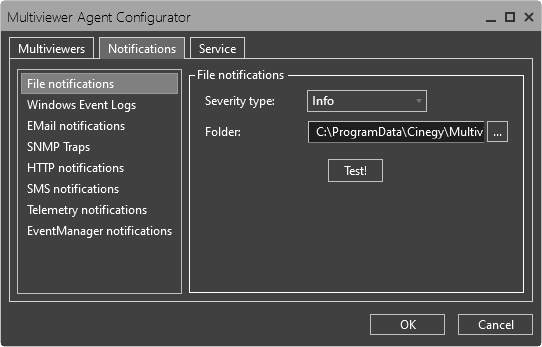
|
Important
|
Refer to the Notification Settings article for detailed information on notifications setup. |
Cinegy Multiviewer Agent Service
Cinegy Multiviewer Agent Service can be managed only by users with local administrative rights. It is required to launch Cinegy Multiviewer Agent Configuration utility using the "Run as administrator" command; otherwise, the corresponding notification message will appear:
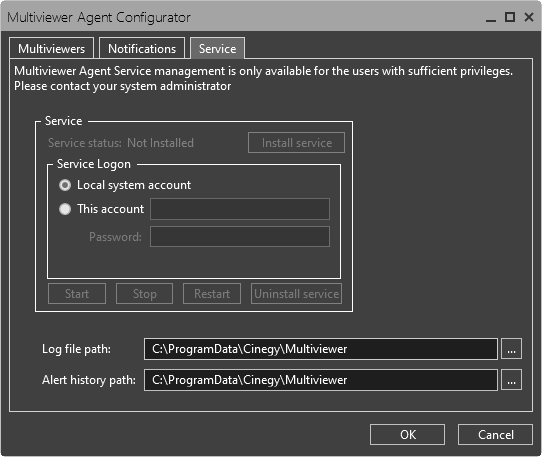
Cinegy Multiviewer Agent works as a Windows service. This service receives incoming alerts from all the monitored Cinegy Multiviewers, removes duplicate alarms and sends notifications according to the specified configuration.
To install the Windows service, press the "Install service" button in the "Service" tab of Multiviewer Agent Configurator:
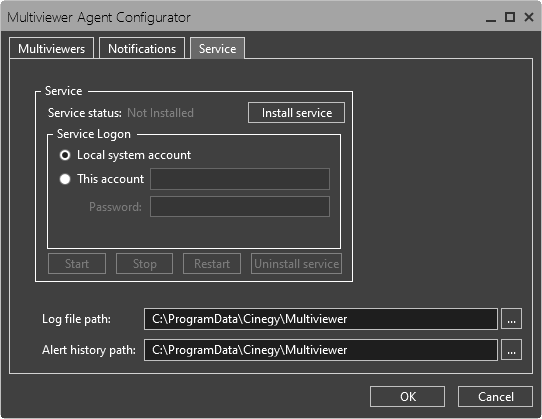
The service can be installed under local user by setting the radio button to the "Local system account" option in the "Service Logon" section of the "Service" tab. To install the service under a different user account, set the radio button to the "This account" option, enter the user name in the field next to it and the password in the field below.
To install it as a Windows service, press the "Install service" button. If the entered data on a different account is invalid or this account does not exist, a warning message appears:
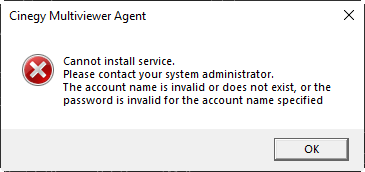
|
To start the service, press the "Start" button. The Cinegy Multiviewer Agent service will be launched as a Windows service: |

|
You can stop the Cinegy Multiviewer Agent service by pressing the "Stop" button in the "Service" tab or by pressing Stop in the "Services" window. |
|
To restart the Cinegy Multiviewer Agent service, use the "Restart" button in the "Service" tab or by pressing Restart in the "Services" window. |
|
To uninstall the Cinegy Multiviewer Agent service, use the "Uninstall service" button. |
The service statuses are indicated with the following colors:
|
The stopped service status is shown in red. |
|
The running service status is shown in green. |
|
When the service is being started/stopped, its status is shown in yellow. |
|
Gray is used to indicate that the service is not installed. |
The log file folders are created automatically when the service is launched. These folders store log information. To change the alert folder location, press the  button or enter the desired path via the keyboard.
button or enter the desired path via the keyboard.

Cinegy Multiviewer Agent also uses its own alert database containing records about all received alerts. By default, the alerts database is stored in the automatically created folder defined in the "Alert history path" field. To change the log folder location, press the "…" button to browse for another folder or enter the desired path via the keyboard.
Having finished Cinegy Multiviewer Agent configuration, press "OK" to apply your settings.
Cinegy Multiviewer Agent can also be started as a separate console without installing it as a Windows service. To do this, run the MultiviewerAgent.exe file from the installation folder. The console window will be launched with all the debug data displayed in real time:

|
Note
|
Cinegy Multiviewer Agent cannot be started as a console if it is already running as a Windows service. |











